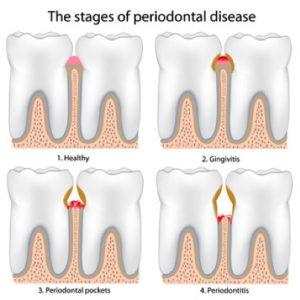Let’s be honest. Many of us see commercials that talk about gingivitis and we don’t see it as some huge earth-shaking health issue. Maybe we think toothpaste companies are attempting to sell their product using some fancy made-up terminology. In some cases it almost sounds as menacing as cooties and just about as real. Truth is this gingivitis is very real, and it is an indicator that something is definitely wrong. If left unattended, gingivitis will lead to a much more serious condition known as periodontal disease. The good news is gingivitis is completely reversible. The bad news is periodontal disease is not!

What is Gingivitis?
Gingivitis is the earliest stage of periodontal disease. The most common cause of gingivitis is poor oral hygiene that encourages plaque to form. Plaque is an invisible, sticky film composed mainly of bacteria. Plaque forms on your teeth when starches and sugars in food interact with bacteria normally found in your mouth. Brushing and flossing your teeth each day removes plaque. Plaque requires daily removal because it re-forms quickly, usually within 24 hours. Plaque that stays on your teeth longer than two or three days can harden under your gum line into tartar. Tartar makes plaque more difficult to remove and creates a protective shield for bacteria. You usually can’t get rid of tartar by brushing and flossing — you need a professional dental cleaning to remove it.
What is Periodontal Disease?
Gingivitis has developed into full blown periodontal disease when the bacterial inflammation of your gums has moved into the supportive tissue and bone. Basically it is a festering infection of the mouth. Periodontitis destroys the tissue and bone that support your teeth. Once that bone is destroyed, it’s gone for good. This can cause the teeth to become loose, fall out, or have to be removed by your dentist. Periodontitis is the most frequent cause of tooth removal for people over 40 years of age.
Periodontal disease is measured in three stages by your dentist; a mild case signifies 1/3 bone loss, moderate periodontal disease is when 1/2 or more of the bone is missing and in severe cases 2/3 of the supporting bone has been destroyed. In severe cases, bone grafting is the only way to address the lost bone.
Can Periodontal Disease Really Lead to Other Significant Health Issues?
Periodontal Disease is caused by bacteria. This bacteria can enter the blood stream through ulcerated and bleeding gums and travel to the heart or and other organs. Periodontal disease has been shown to lead to increased risk for the following serious health problems: heart disease, diabetes, stroke, respiratory diseases including pneumonia, and pre-term births.
What Should I Look For?
Healthy gums are firm and pale pink. If your gums are puffy, dusky red and bleed easily, you may have gingivitis. Because gingivitis is seldom painful, you can have gingivitis without even knowing it. Eventually, it causes the tissues to separate from the tooth and form deepened spaces called pockets. If left untreated, the disease can progress to the bone. Because gum inflammation and bone destruction are largely painless, people may wrongly assume that the painless bleeding after teeth cleaning is insignificant. It is not normal, nor is it insignificant, for your gums to bleed.
5 Ways to Avoid Periodontal Disease
- Brush your teeth at least 2 times daily. Be sure to brush a full 2 minutes and brush all the tooth surfaces.
- Properly floss regularly. Flossing is more than just removing the food between your teeth that you can feel with your tongue. Flossing should scrape off all the film between and around each tooth where your tooth brush can’t reach.
- Have your teeth professionally cleaned every six months. Remember- You usually can’t get rid of tartar by brushing and flossing — you need a professional dental cleaning to remove it.
- See your dentist regularly, as in every six months when you go in to have your teeth cleaned!
- Quit Smoking — cigarette smoking may be responsible for more than half the gum disease in US adults. Current smokers are four times more likely to have gum disease than those who have never smoked. The more cigarettes you smoke each day, the greater the odds you’ll get gum disease.
Are you looking for a great dentist?
Call for AppointmentYou will love our Martin Taylor Dentistry office. You will also enjoy the special way we say thanks to every new patient.
Back to Blog Page






